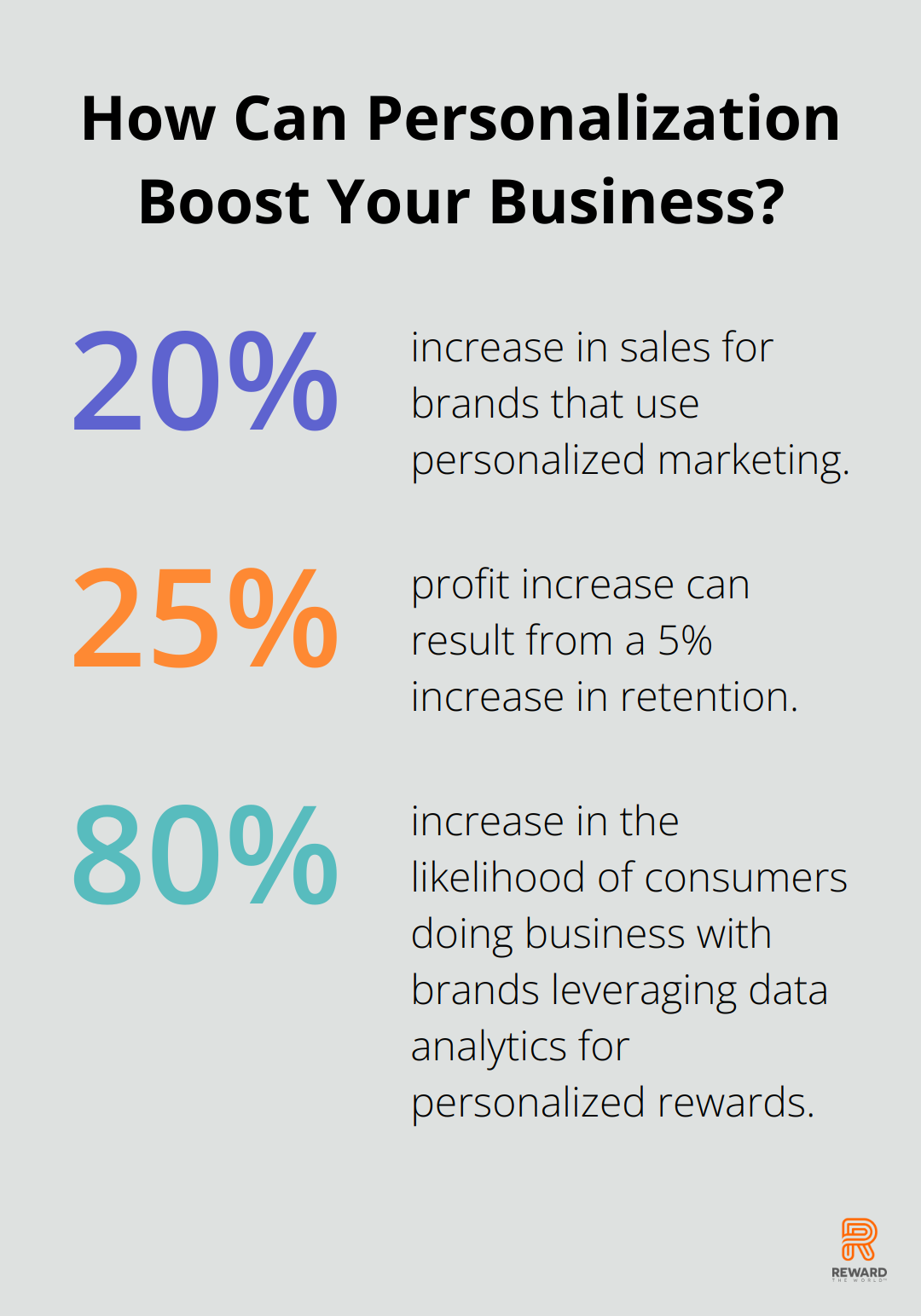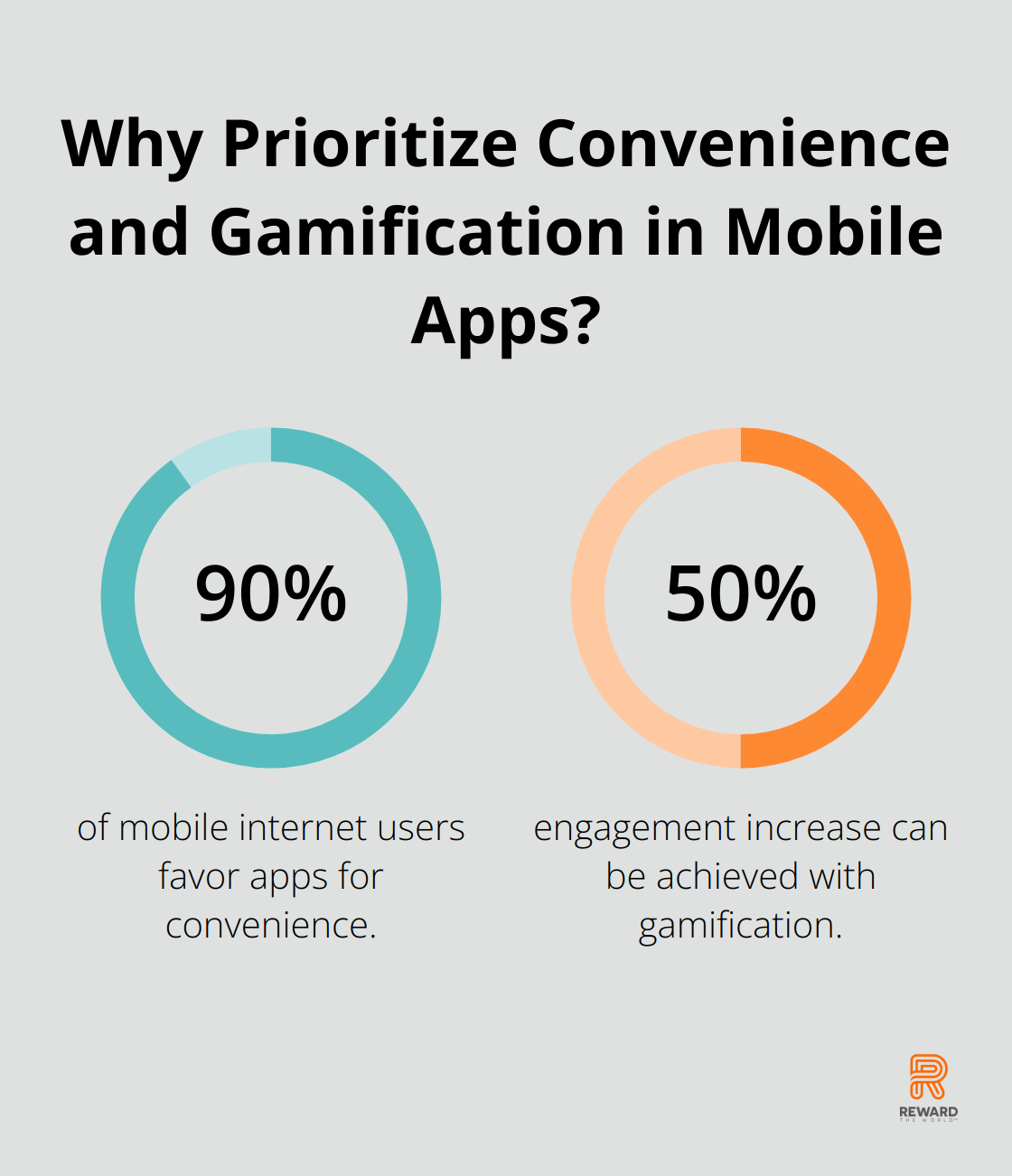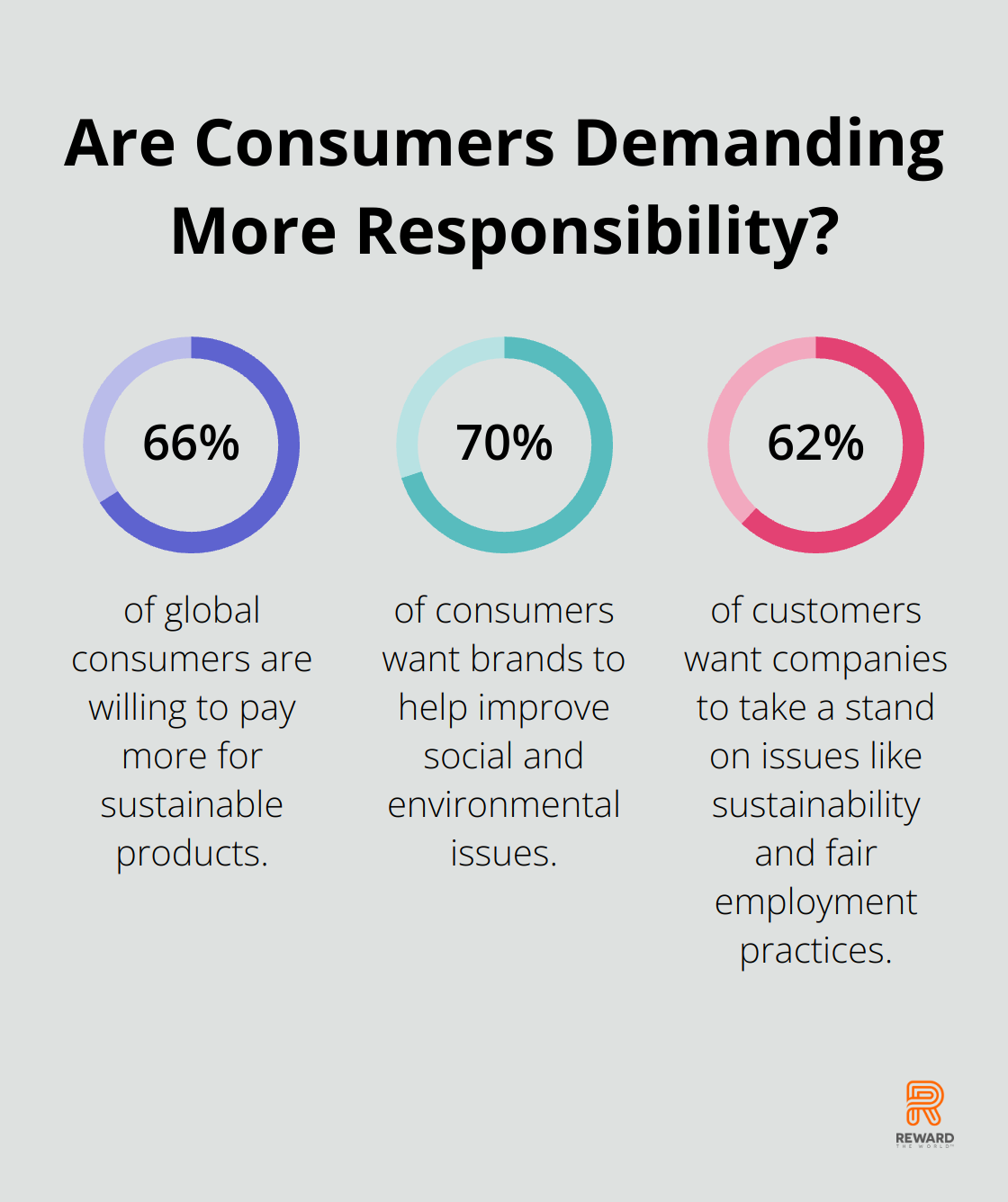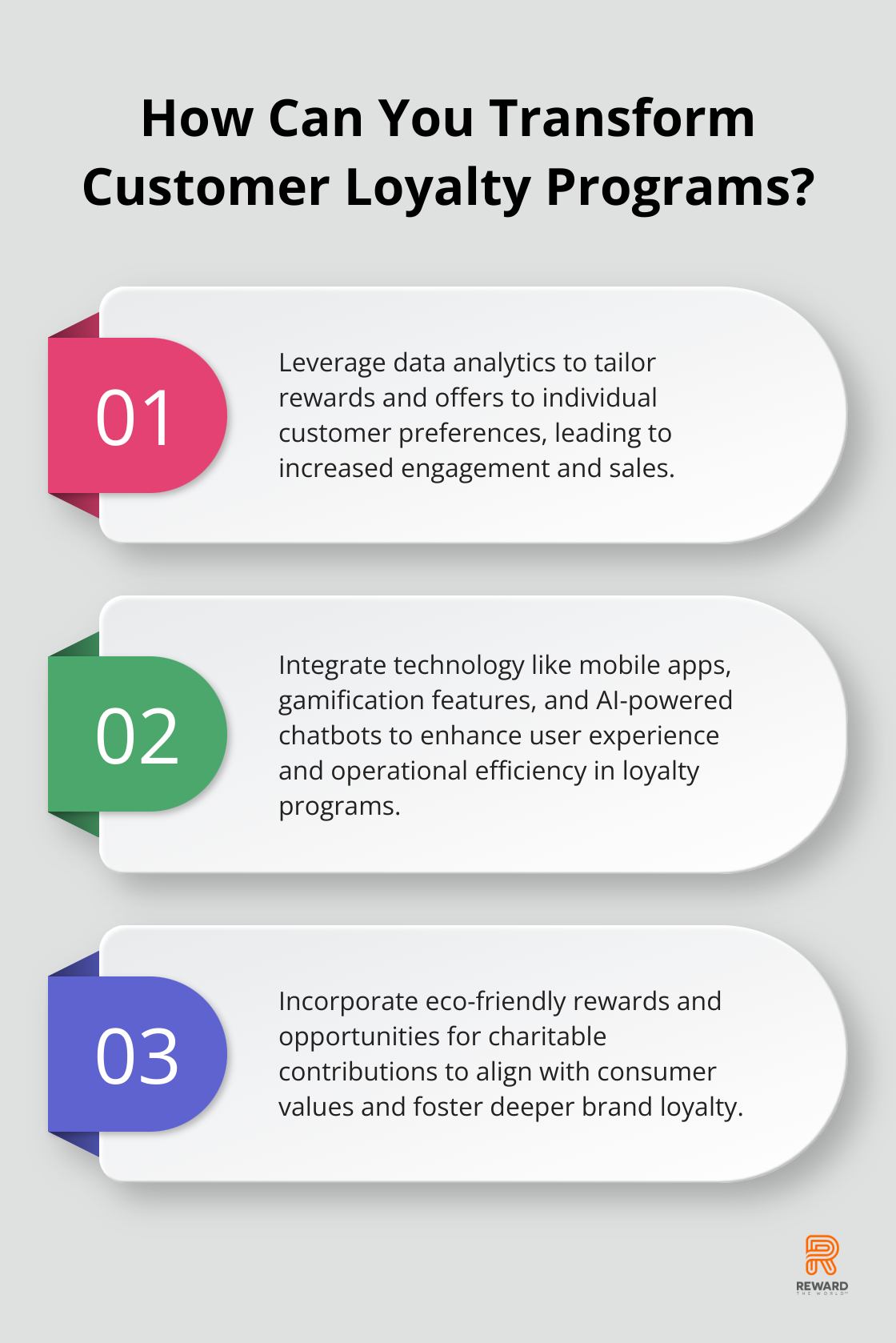
Customer loyalty rewards are evolving rapidly, reshaping how brands engage with their customers.
From personalized programs tailored through data analytics to tech integrations like mobile apps and AI-powered chatbots, businesses are pushing boundaries.
Sustainability and social responsibility are also becoming central themes, offering eco-friendly rewards and supporting charitable contributions.
Here at Reward the World, we’re diving into these latest trends to show how they are transforming customer retention and engagement.
How Does Personalization Drive Loyalty?
Personalized loyalty programs are more than just a trend; they’re a game-changer in customer retention. Brands leveraging data analytics for personalized rewards are seeing impressive results, with an 80% increase in the likelihood of consumers doing business with them.
Leveraging Data for Personalization
Data analytics is at the heart of personalized loyalty programs. By analyzing customer behavior, purchase history, and preferences, businesses can tailor rewards to individual needs. This approach has been proven to boost engagement. For instance, brands that use personalized marketing see a 20% increase in sales. Tools like customer data platforms (CDPs) centralize this data, enabling actionable insights to craft more relevant offers.
Customized Offers Enhance Engagement
Offering customized rewards based on customer preferences makes interaction with the loyalty program more meaningful. An excellent example is Amazon Prime, where members receive personalized product recommendations, leading to higher satisfaction and spending. Personalized experiences not only enhance the customer experience but also make the customer feel valued. This has led to personalized rewards programs achieving four times higher spending from members than non-personalized ones.
The Impact on Customer Retention
The impact of personalization on customer retention is significant. Data shows that a 5% increase in retention can lead to a 25% profit increase. Companies that provide tailored rewards see higher repeat business and customer loyalty. Customers with personalized experiences report a higher likelihood of staying with a brand long-term. This data highlights that investing in personalization isn’t just beneficial; it’s necessary for sustaining competition.

Technologies like AI and machine learning further enhance personalization by predicting customer needs before they even arise, making the customer feel understood and valued. With the growing importance of customer data privacy, brands must ensure they use this data responsibly to maintain trust. Adopt clear data policies and transparency practices to foster better customer relationships.
In an evolving market, personalized loyalty programs stand out as a vital strategy for retaining customers and driving revenue. By investing in data analytics and customized offers, businesses can significantly enhance their loyalty programs and secure long-term customer commitment.
How Is Technology Transforming Loyalty Programs?
Integration of technology in loyalty programs is reshaping how brands connect with their customers. Advanced tools like mobile apps, gamification features, and AI-powered services are now essential for driving engagement and satisfaction.
Mobile Apps and Digital Wallets
Mobile apps have revolutionized loyalty program accessibility. With over 90% of mobile internet users favoring apps, brands are investing in dedicated loyalty applications. Apps streamline user experiences, offering instant access to rewards and personalized notifications. Digital wallets such as Apple Pay and Google Wallet add another layer of convenience, allowing customers to effortlessly manage and redeem points during transactions. Starbucks exemplifies this success, reporting that 23.3 million members actively use their mobile app for purchases and rewards.
Gamification and Interactive Features
Gamification is not just a buzzword; it’s a critical element for increasing customer engagement. Brands like Nike have nailed this, integrating fitness challenges and achievement badges into their apps. Data shows that adding game-like elements can boost engagement by up to 50%. Interactive features like spin-to-win games, point multipliers, and tiered rewards keep customers returning, fostering a deeper sense of loyalty.
Use of Artificial Intelligence and Chatbots
Artificial Intelligence (AI) and chatbots are game-changers for personalized customer service in loyalty programs. AI can analyze vast amounts of customer data to provide tailored recommendations and predict future behaviors. For instance, Sephora’s chatbot suggests products based on past purchases, enhancing the shopping experience. Chatbots offer real-time support, answering queries and guiding users through reward redemptions. Integrating these technologies not only enhances user satisfaction but also operational efficiency.

As technology continues to evolve, brands that leverage these tools in their loyalty programs will enjoy higher engagement, retention, and customer satisfaction.
How Are Sustainability and Social Responsibility Shaping Loyalty Programs?
Eco-Friendly Rewards and Practices
Sustainability is quickly becoming a pillar of modern loyalty programs. Brands that offer eco-friendly rewards are not just keeping up with a trend; they are meeting a growing consumer demand. According to Nielsen, 66% of global consumers are willing to pay more for sustainable products. Companies can capitalize on this by offering rewards like reusable bags, eco-friendly product discounts, and even plant-a-tree initiatives. IKEA, for example, offers discounts on eco-friendly products through its loyalty program, leading to increased engagement and positive brand perception.
Incorporating Charitable Contributions
Incorporating charitable contributions into loyalty programs resonates strongly with customers, fostering a deeper emotional connection to the brand. Research by Cone Communications found that 70% of consumers want brands to help improve social and environmental issues. Brands like TOMS have successfully integrated social responsibility by allowing customers to direct a portion of their rewards to various causes. This not only enhances customer loyalty but also elevates the brand’s ethical standing. Real-world impact can be demonstrated by transparent reporting of contributions, which builds trust and encourages continued participation.
How Sustainability Impacts Brand Loyalty
A commitment to sustainability significantly boosts brand loyalty. Consumers increasingly align with brands that reflect their values. A study by Accenture revealed that 62% of customers want companies to take a stand on issues like sustainability and fair employment practices. Brands that genuinely integrate sustainability into their loyalty programs see a notable increase in retention and customer advocacy. Salesforce research indicates that 80% of consumers are more loyal to companies that demonstrate ethical practices.

Adopting sustainability practices is not just a marketing strategy; it’s a long-term investment in customer engagement. Brands must stay transparent about their sustainability efforts and continually innovate to offer new eco-friendly rewards. With a clear focus on sustainability and social responsibility, loyalty programs transform into powerful tools for not only retaining customers but also making a positive impact on the world.
Conclusion
The latest trends in loyalty rewards—such as personalized programs, technology integration, and sustainability—are rapidly reshaping the ways brands engage with their customers. Personalization aligned with data analytics is proving crucial for enhancing customer retention. The statistics show that brands using personalized marketing see a 20% increase in sales, and companies that tailor their rewards witness a 25% profit increase from a mere 5% boost in retention rates.

Incorporating advanced technology, including mobile apps, gamification, and AI, has become essential for driving customer engagement. Nike, for example, has seen a 50% increase in engagement through its gamification strategies, while Starbucks reports millions of active users on its dedicated mobile app.
Sustainability and social responsibility are taking center stage, offering brands an opportunity to align values with consumer expectations. Research from Nielsen indicates that 66% of global consumers are willing to pay more for sustainable products. Real-world examples, such as IKEA’s discounts on eco-friendly products, illustrate the practical benefits of integrating sustainability into loyalty programs.
These trends are not just improving customer engagement but also driving significant business outcomes. Investing in these evolving strategies is essential for brands aiming to stay competitive and foster long-term loyalty. The future of loyalty programs lies in continuous innovation, leveraging data responsibly, and aligning with consumer values.
Reward the World stands at the forefront of this evolution, providing a robust global incentives platform available in 15 languages. Catering to over 250 million users, it offers instant rewards ranging from eGift cards to cash payments, with over 60 million rewards across various categories. With seamless integration, GDPR compliance, and round-the-clock availability, Reward the World is an ideal solution for companies looking to elevate customer engagement effectively. Learn more about how Reward the World can transform your loyalty program.
